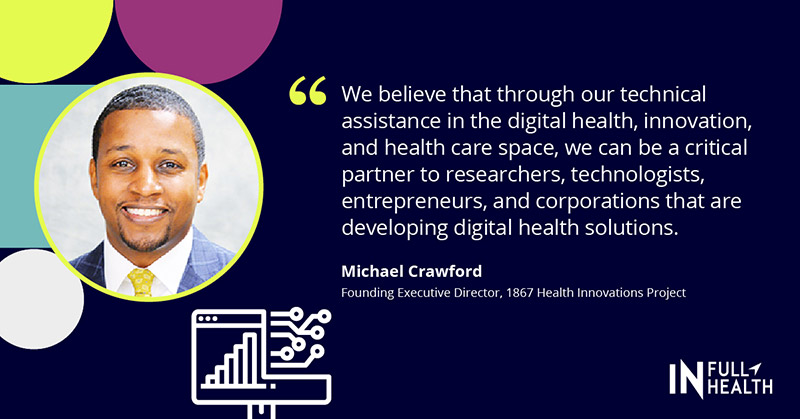Michael Crawford (he/his) is the Associate Dean for Strategy, Outreach, and Innovation at Howard University College of Medicine. He is also the Founder and Executive Director of the 1867 Health Innovations Project at Howard University.
The 1867 Health Innovations Project collaborates with innovators, researchers, entrepreneurs, and corporate partners to address complex health challenges confronting medically underserved and vulnerable communities from a digital health perspective.
With a focus on digital technologies, Michael Crawford shares how he came to health equity work and the 1867 Health Innovations Project.
In Full Health (IFH): What inspired you to focus your work on health equity and health technology?
Michael Crawford: Approximately 5 years ago, I was working at a federally qualified health center, where we were exploring innovative ways to provide a “one-stop” healthcare experience for patients. We decided to build a facility adjacent to a bus and metro station with innovative programs, including primary care, dental, behavioral health, job training, and short-term housing to address longstanding social determinants of health.
The hope was that the project would dramatically improve health access, outcomes, and the patient experience. The project prompted numerous questions regarding the role of digital health in medically underserved and vulnerable communities, especially tech’s ability to close the health disparities gap.
During that time, I conducted a comprehensive literature review on digital health, innovation, and health disparities in the US and stumbled upon compelling data about life expectancy. It was an NYU Langone Health analysis that examined life expectancy between the most affluent and least affluent communities in cities across the U.S. Washington, DC was top three — or bottom 3 — in that analysis, with a 27.5-year life expectancy gap. The two communities that were highlighted in this survey were 5 miles apart.
That was an unacceptable reality for my colleagues and my colleagues. With that understanding, we started to look at how we could become a health innovation center that focused on:
- Facilitating and accelerating access to digital health solutions
- Building a dynamic pilot environment to test and validate solutions and models
- Cultivating an environment to collaborate with entrepreneurs, innovators, researchers, and partners to provide the requisite technical assistance to build the appropriate use cases and solutions that best align with population needs
- Elevating patient and provider voice to inform product development and digital adoption
- Elevating and scaling digitally informed models of care
From there, we developed Howard’s 1867 Health Innovations Project.
SUBSCRIBE
Stay in the loop about new blog posts from equitable health innovation leaders, helpful resources and tools to help you bring the Principles to life, upcoming events, and more by joining our email list.
SUBSCRIBEIFH: Why is it so important that this program was created and supported by a historically Black university? What difference do you think this makes?
Michael Crawford: Howard is one of four HBCU medical schools in the country and the only institution with a hospital. In addition, Howard trains all health science disciplines, including a college of dentistry, a college of pharmacy, a college of nursing and allied health, and a college of medicine. Our goal is to ensure the next generation of health professionals have the requisite technical and digital expertise to thrive in the future of healthcare. We focused on developing digitally informed models supported by interprofessional teams to improve health access, outcomes, patient experience, and affordability for the most vulnerable communities.
We believe 1867 is a critical partner for researchers, technologists, entrepreneurs, and corporations that are developing digital health solutions, given our global health perspective, research acumen, deep digital health and innovation expertise, and robust understanding of vulnerable communities.
Howard was a natural place to establish a digital health innovation program. Howard comprises 13 schools and colleges, is recognized as a leader in STEM, and the medical school is internationally regarded for training African American physicians and physicians of color. This enables 1867 to leverage deep subject matter expertise to advance models that are effective and reflect the needs of the community.
Expressing Gratitude
There are so many people who have made and continue to make this work possible. You do not do these things by yourself. We’ve received so much support from individuals, companies, trade associations, and regulators — it’s really been a collective effort. Thank you.
Michael Crawford
Founding Executive Director, 1867 Health Innovations Project
IFH: 1867 collaborates “researchers, innovators, entrepreneurs, and corporate partners, who desire to tackle complex health challenges confronting medically underserved communities,” while also creating space for patient participation as well — why is this community approach so integral to your work?
Michael Crawford: Elevating the voice of the patient and provider, otherwise known as the end user is critically important for digital health adoption and engagement. If the end user is not involved in the early stages of developing a model, product, or solution, there might be a misalignment in terms of user expectations, product interface, product information, onboarding, and customer support.
Our model is predicated on a patient-centric/end-user approach. We partner with patients, families, communities, and health professionals to understand their digital health needs. We use this information to inform use cases and clinical pilot projects that will have the biggest impact on the target population.
Insights [from the 1867 Health Innovations Project] allow us to co-create with partners to ensure their solutions fully address the needs of the patients and community. The patient voice is indispensable to our model.
Michael Crawford
Founding Executive Director, 1867 Health Innovations Project
IFH: What success has the project seen so far?
Michael Crawford: Since our founding in April 2020, we have established significant strategic partnerships. We have established a relationship with AARP Innovation Labs to explore tech and data solutions for adults who are 50 and older — especially those that are underserved.
We have established a relationship with the Department of Health & Human Services where we are exploring health and data solutions to improve the health and well-being of sickle cell disease patients, particularly in areas such as in the transition from pediatrics to adulthood, pediatric care, care coordination, and patient and family engagement.
We have also established a relationship with the D.C. housing authority to explore tech and data solutions to improve how individuals in low-income and public housing receive their health care. We are continuously exploring new innovative ways to improve health for all communities and we are so excited that our work is making a difference.
IFH: How do you hope the 1867 Health Innovations Project continues to grow and be utilized to advance equity in health innovation?
Michael Crawford: We are exploring new partnerships and initiatives to expand our ability to impact digital health, data, and health equity. We are exploring new use cases in different chronic disease areas, along with new digital health areas that will expand patient access and learning opportunities for faculty and students. Further, we are evaluating different initiatives to convene thought leaders and to elevate the dialogue nationally. Stay tuned.
IFH: How has working with the 1867 Project impacted how you think about equity in health innovation?
Michael Crawford: My work at 1867 has demonstrated that trust and data are critically important to the innovation process. Historically, health systems and providers have operated under the notion of perceived trust. The pandemic has demonstrated that we need to transition to a mindset of earned trust. 1867 is earning trust through consistent engagement, listening with intention, collaborating authentically, and being transparent about our intentions.
SUBSCRIBE
Stay in the loop about new blog posts from equitable health innovation leaders, helpful resources and tools to help you bring the Principles to life, upcoming events, and more by joining our email list.
SUBSCRIBE



Comments are closed.